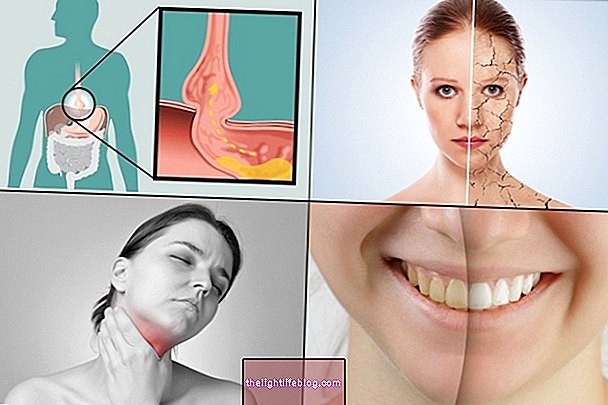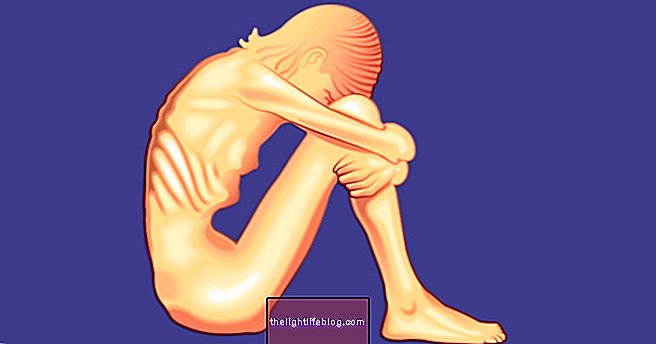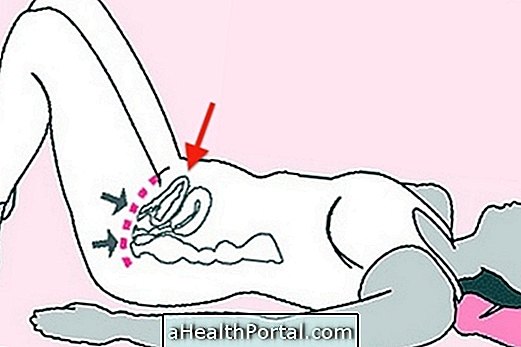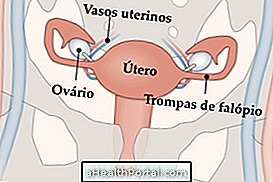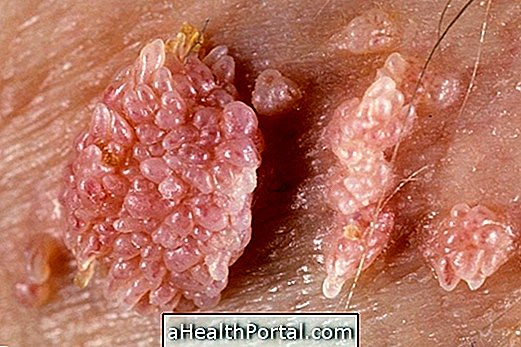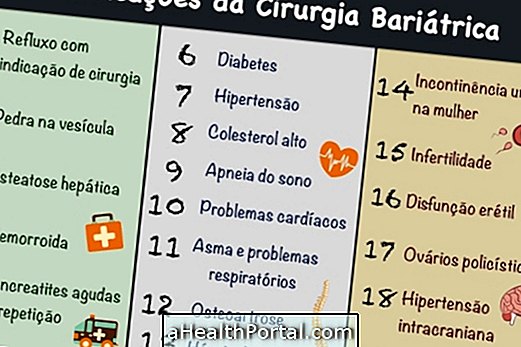A child who has a hard time eating certain foods due to their texture, color, smell or taste may have an eating disorder, which needs to be identified and treated correctly. Generally, these children show a strong aversion to some foods, showing a desire to vomit or having tantrums for not eating.
It is normal for almost all children to go through a phase of decreased appetite at around 2 years of age, which ends up resolving without any specific treatment. However, children with eating disorders tend to show greater selectivity in what they eat since the introduction of the first foods, not being able to vary much in the type of food they eat, or in the way they are prepared.

Main childhood eating disorders
Although they are uncommon, there are some eating disorders that can cause a child to eat only a certain type of food, with a certain texture or at a certain temperature:
1. Restrictive or selective eating disorder
It is a type of disorder that usually arises in childhood or adolescence, but that can also appear or persist in adulthood. In this disorder, the child limits the amount of food or avoids its consumption based on his experience, color, aroma, flavor, texture and presentation.
The main signs and symptoms of this disorder are:
- Important weight loss or difficulty reaching the ideal weight, depending on your age;
- Refuse to eat certain food textures;
- Restriction of the type and quantity of food eaten;
- Lack of appetite and lack of interest in food;
- Very restrictive food selection, which may get worse over time;
- Fear of eating after an episode of vomiting or choking;
- Presence of gastrointestinal symptoms such as stomach upset, constipation or abdominal pain.
These children tend to have problems in relationships with other people due to their eating problems and may have significant nutritional deficiencies that affect their growth and development, as well as their performance at school.
Find out more details of this selective eating disorder.
2. Disturbance of sensory processing
This disorder is a neurological condition where the brain has difficulty receiving and responding properly to information that comes from the senses such as touch, taste, smell or vision. The child can be affected in only one or several senses, and therefore a child with this disorder may respond exaggeratedly to any stimulus of the senses, with some sound, certain types of tissue, physical contact with certain objects being unbearable, and even some types of food.
When taste is affected, the child may have:
- Oral hypersensitivity
In this case the child has extreme food preferences, with a very small variation of foods, can be demanding with the brands, resist to try new foods and are unable to eat at other people's homes, avoiding spicy, spicy, sweet or salad foods.
It is possible that you will only eat bland, puree or liquid foods after 2 years of age, and you may be surprised with other textures. You may also find it difficult to suck, chew or swallow for fear of choking. And you can resist or refuse to go to the dentist, complaining about the use of toothpaste and mouthwash.
- Oral hyposensitivity
In this situation, the child may prefer foods with an intense flavor, such as excessively spicy, sweet, bittersweet or salty foods, even feeling that the food does not have enough seasoning. And you can say that all foods have the 'same taste'.
It is also possible for you to chew, taste or lick inedible objects, eating your hair, shirt or fingers frequently. Unlike oral hypersensitivity, children with this disorder may like electric toothbrushes, like going to the dentist and drooling excessively.

When to go to the doctor
In cases where signs and symptoms of an eating disorder are evident, the ideal is to seek help from the pediatrician as soon as possible, so that the alteration is evaluated. In addition to the pediatrician, an evaluation by a speech therapist and even a psychologist who can carry out therapies that help the child to slowly get used to new foods may also be advised.
This type of therapy can be called systematic desensitization, and consists of introducing food and objects into the child's daily life that help him / her overcome the type of disorder that has been identified. There is also a therapy called "Wilbarger's Protocol in the mouth", where several techniques are performed that aim to help the child to develop greater sensory integration.
A consultation with a nutritionist is also indicated, due to the restriction of food, which can cause malnutrition, and an individualized nutritional plan must be elaborated, with the possibility of using supplements to offer the calories that the body needs.
What to do to make your child eat everything
Some practical advice for making your child eat a greater variety of foods or in greater quantities are:
- Offer new foods preferably when the child is hungry, because they will be better accepted;
- For the child to accept new foods, try to eat this food, not giving up before trying about 8 to 10 times, on different days;
- Combine favorite foods with less accepted ones;
- The child usually eats better if he chooses at least 2 foods from the meal;
- Prevent the child from drinking a lot of fluids immediately before meals;
- The time to eat should not be less than 20 minutes and more than 30 minutes, enough time for the child to recognize the feeling of satiety in his body;
- If the child does not want to eat, he should not be punished, because this reinforces the negative behavior, the plate must be removed and he can leave the table, but the next meal should be offered a nutritious food;
- It is important that the child and the family are seated at the table, calmly, and it is important to have fixed times for meals;
- Take the child to buy food at the market and help with the choice and preparation of meals and how it is served;
- Read tales and stories about food.
Check out these and other tips in the following video:

In cases where a disorder is evident, it is possible that the process to regulate feeding takes weeks, months and sometimes years of treatment before your child can enjoy food in a 'normal' way, have adequate food and adapt, It is very important to seek help from health professionals, such as pediatricians and psychologists, for these situations.
Was this information helpful?
Yes No
Your opinion is important! Write here how we can improve our text:
Any questions? Click here to be answered.
Email in which you want to receive a reply:
Check the confirmation email we sent you.
Your name:
Reason for visit:
--- Choose your reason --- DiseaseLive betterHelp another personGain knowledge
Are you a health professional?
NoMedicalPharmaceuticalsNurseNutritionistBiomedicalPhysiotherapistBeauticianOther



